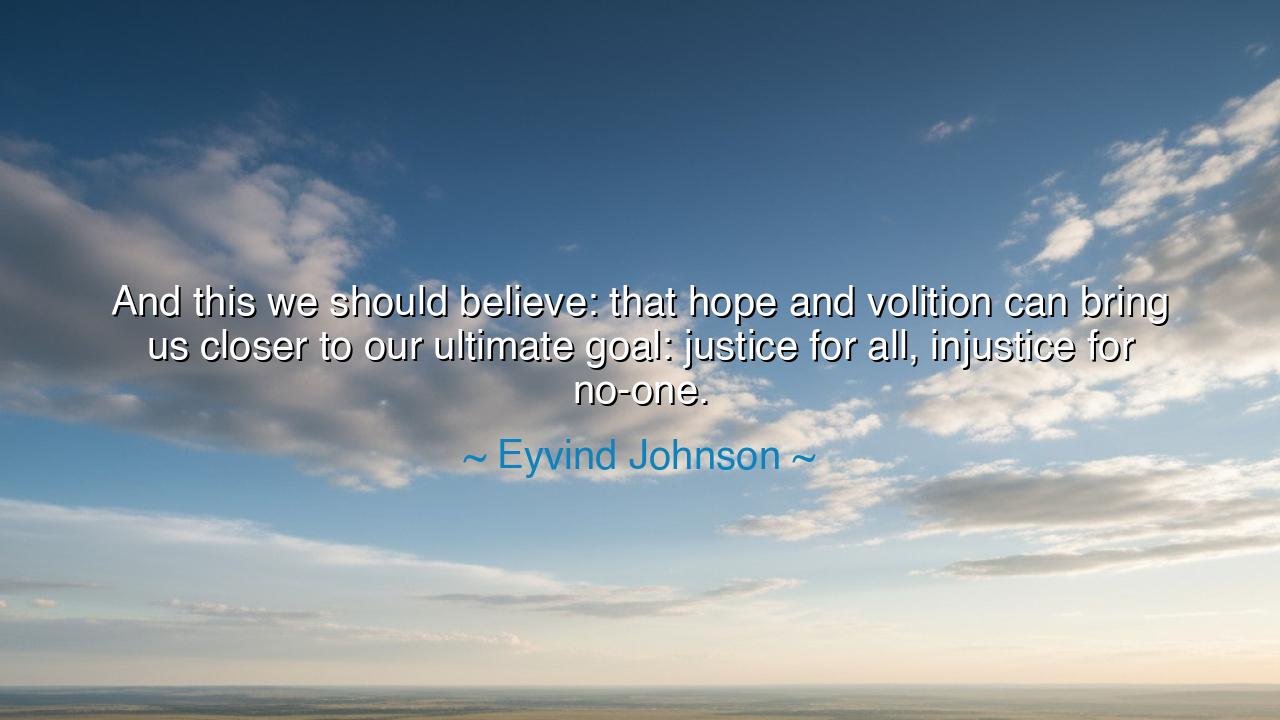
And this we should believe: that hope and volition can bring us
And this we should believe: that hope and volition can bring us closer to our ultimate goal: justice for all, injustice for no-one.






The words of Eyvind Johnson, “And this we should believe: that hope and volition can bring us closer to our ultimate goal: justice for all, injustice for no-one,” are not merely the reflection of a poet’s heart—they are the whisper of conscience through the corridors of time. Johnson, a writer forged in the fires of twentieth-century struggle, spoke from a world still trembling from war and tyranny. He had seen the cruelty of ideologies that trampled men in the name of progress, and he knew that the fight for justice was not waged only with laws and weapons, but with the indomitable will of the human spirit. His words are a creed for all who dare to believe that righteousness can yet prevail in a world bent by power.
When Johnson spoke of hope, he did not mean the fragile wish of the idle dreamer, but the fierce faith that persists when all seems lost. Hope, in his vision, is a sacred flame passed from generation to generation, kept alive through despair. It is the belief that no tyranny lasts forever, that truth, though crushed beneath the heel of might, will rise again. And with hope, he paired volition—the act of will, the deliberate choice to do good, to stand, to act when silence is easier. For hope without action is a bird with broken wings, and will without hope is a ship without a star. Together they form the twin pillars upon which all justice must stand.
In his homeland of Sweden, and across Europe, Johnson saw the long shadow of injustice. The wars had left more than ruins—they had left the poison of cynicism, the belief that goodness was naïve and power was inevitable. Yet Johnson rejected despair. He understood that every age must choose whether to bow before injustice or to resist it with courage. His words echo the cry of prophets and reformers throughout the ages—those who refused to surrender their belief in human dignity. They knew, as Johnson did, that justice is not a gift from rulers, but a victory of the heart.
Consider the story of Nelson Mandela, who, imprisoned for twenty-seven years, carried within his soul the same faith Johnson proclaimed. In the darkness of his cell, Mandela did not let bitterness devour him. He clung to hope, and with unbroken volition, he prepared himself to lead his nation toward reconciliation. When he emerged, he did not seek vengeance, but justice for all, injustice for no-one—not even those who had wronged him. His triumph was not only political but spiritual; he proved that the power of moral will can rebuild nations where violence once reigned. He became living proof that Johnson’s faith in humanity’s capacity for justice was not in vain.
There is a rhythm to history—a ceaseless battle between cruelty and compassion, greed and fairness. In every age, voices arise that call for justice, and others that mock it as weakness. Yet the march of conscience cannot be stopped, for the human heart, though often led astray, yearns for equilibrium. Johnson’s call to believe is a call to each soul to join this ancient struggle. For justice is not merely the work of courts and kings—it begins in the secret places of the spirit, in how we see our neighbor, in how we lift the fallen, in how we forgive and demand better of ourselves.
If we are to walk the path Johnson marked, we must cultivate within ourselves both hope and will. Hope, so that we do not fall to despair when injustice seems triumphant; will, so that we act even when victory seems far away. In our homes, our workplaces, our nations, we must refuse to become numb to suffering. Each small act of fairness, each word of truth spoken against deceit, each gesture of compassion is a stone laid upon the road to justice for all. The world will not change in a day, but it changes each day through those who refuse to give up.
So remember this teaching, children of the future: to seek justice is to labor in the service of eternity. You may never see the world you dream of, but your hope and your volition will echo in the hearts of those who come after you. For justice is not a destination but a light carried forward, passed from the weary to the steadfast, from the fallen to the rising. Believe, then, as Eyvind Johnson believed—that though the world may tremble, the human soul still has the power to bring forth a dawn where all are free, and none are wronged.






AAdministratorAdministrator
Welcome, honored guests. Please leave a comment, we will respond soon